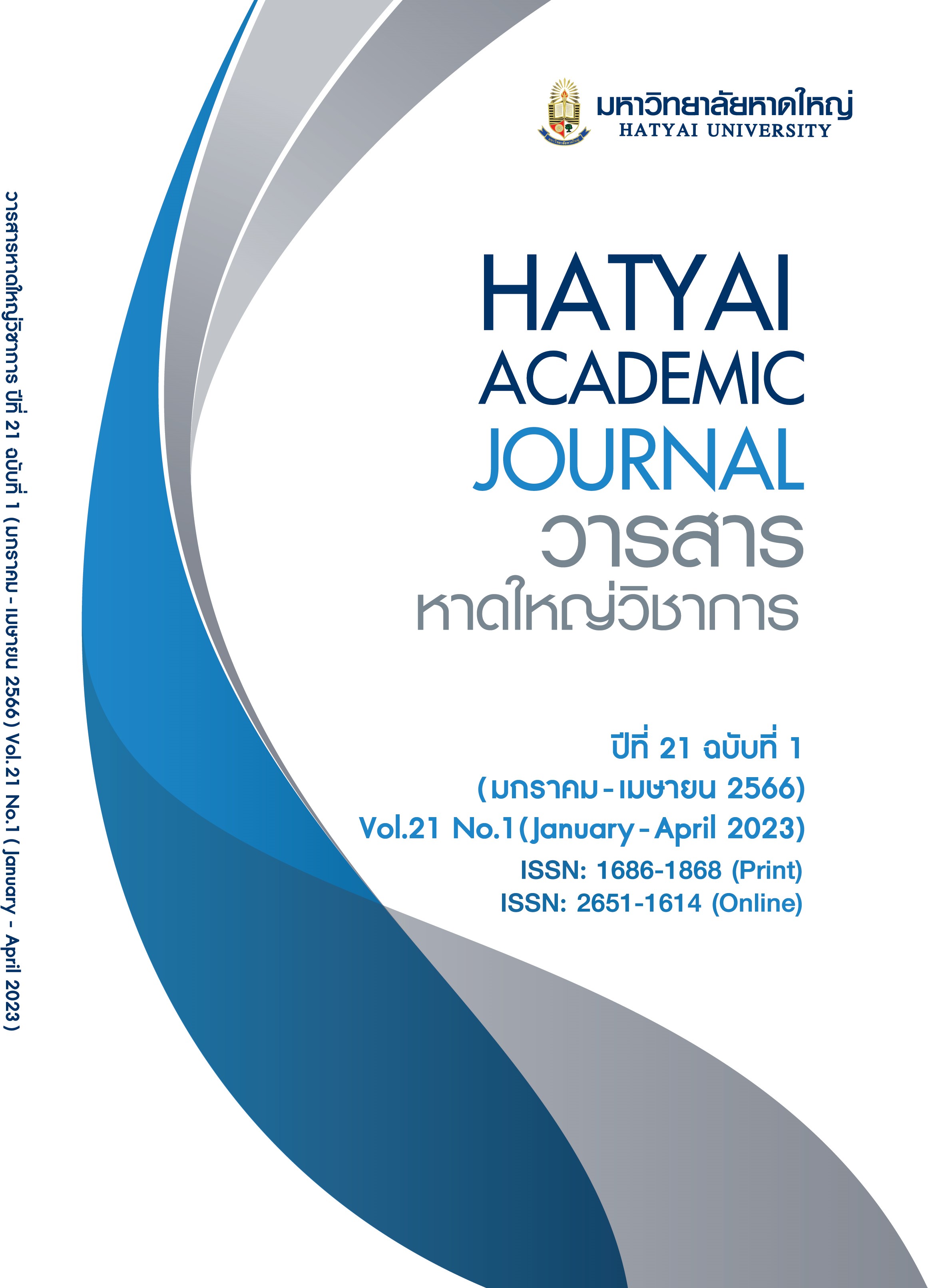Organizing Non-formal Education Activities for Out-of-School Children
Main Article Content
Abstract
Out-of-school children are children who do not have access to the education system and are not entitled to an education. These children include children with disabilities, children and youth in the justice system, stateless children, children of migrant workers, children in poor communities, ethnic minority children, and the children of Muslim immigrant parents across the country and in the southernmost border area. Educational activities for these children should involve non-formal educational activities that are likely to be flexible and consistent with their characteristics and needs, such as basic knowledge, life skills development, and career skill development. The process of organizing activities should start with studying the nature and characteristics of the children, analyzing their needs and basic interests, organizing, and monitoring as well as assessing the activities
Article Details

This work is licensed under a Creative Commons Attribution-NonCommercial-NoDerivatives 4.0 International License.
All published articles are evaluated by three qualified peer reviewers from various institutions through a double-blind process, where reviewers do not know the authors’ identities and authors do not know the reviewers’ identities. The content and articles in the Hatyai Academic Journal reflect the authors’ views only and are neither the opinions of the editorial board nor the responsibility of Hatyai University. The Editorial Board of the Hatyai Academic Journal allows articles to be reproduced for academic purposes, on the condition that the original source is clearly cited.
References
Boonkoum, W., Boonkoum, P., & Po Ngern, W. (2016). Development of learning activities model of sub-district non-formal education facilitator in the western region to develop learners' thinking skills. Veridian E-Journal, Silpakorn University (Humanities, Social Sciences and Arts), 9(3), 840-856. [in Thai]
Department of Juvenile Observation and Protection. (2019). Report of the state's operations to the public annually, fiscal year 2018. Retrieved from http://www. djop.go.th/Djop/index.php [in Thai]
Equitable Education Fund. (2020). Announcement of the Office of the Education Equality Fund on the topic of funding for the project to support the development of teachers and non-educational children for the academic year 2020. Retrieved from https://www.eef.or.th/notice/858 [in Thai]
Jitradab, S. (2020). A systematic drive for the development of teachers and children outside the education system. Bangkok: Equitable Education Fund. [in Thai]
Masatienwong, C. (2007). Thai children on the crossroads: A synthesis case study of children and youth in the project to monitor the situation of children and youth by provinces 2004-2005. Bangkok: Chulalongkorn University Press. [in Thai]
Ministry of Education. (2008). The Promotion of Systematic and Informal Education Act, B.E. 2551. Bangkok: Ministry of Education. [in Thai]
Non-fomal and Informal Education Center for Special Target Groups. (2018). Guidelines for the management of non-formal and informal education for the disadvantaged. Bangkok: Akepimthai. [in Thai]
Office of the Basic Education Commission. (2019). Rights and laws related to people with disabilities. Retrieved from https://www.obec.go.th/archives/88717 [in Thai]
Office of the Education Council. (2018). Report on education for non-Thai nationals and children of migrant workers in Thailand. Bangkok: Prigwhangraphic. [in Thai] Pathumcharoenwattana, W. (2014). Introduction on non-formal education. Bangkok: Faculty of Education, Chulalongkorn University. [in Thai]
Pathumcharoenwattana, W. (2020a). Guidelines for providing alternative education for children and youth in the justice system. Bangkok: Academic Center Project and Academic Network for Children, Youth and Families. [in Thai]
Pathumcharoenwattana, W. (2020b). Out-of-school teacher. Bangkok: Equitable Education Fund. [in Thai]
Pathumcharoenwattana, W. (2021). Non-formal education for lifelong learning enhancement for specific target groups. Bangkok: Faculty of Education, Chulalongkorn University. [in Thai]
Pathumcharoenwattana, W., Pathumcharoenwattana, W., Charungkaittikul, S., Chuymanee, K., & Chudasring, R. (2021). Promotion and development of movement mechanism for out-of-school teachers and children. Bangkok: Equitable Education Fund. [in Thai]
Patrawart, K. (2020). Reducing inequality in education management: 30-year lessons from the Jomtien Declaration to a new way of Thai education after COVID-19. Retrieved from https://research.eef.or.th/out-of-school-children-solution [in Thai]
Pitukthanin, A. (2020). Lessons in working on child development outside the educational system of both domestic and international organizations. Bangkok: Equitable Education Fund. [in Thai]
Quality Learning Foundation. (2012). Situation of children, youth and socially disadvantaged people. Retrieved from http://www.qlf.or.th/Home/Contents/147 [in Thai]
Ratana-Ubol, A. (1998). Non-formal education and disadvantaged children. Bangkok: Department of Education, Chulalongkorn University. [in Thai]
Research Center for Children and Youth Development. (2020). 10 Gray's Issues Interesting children and youth. Bangkok: Research Center for Children and Youth Development, Faculty of Education, Chulalongkorn University. [in Thai]
School of Changemakers. (2020). Situation of the dropout. Retrieved from https://www. schoolofchangemakers.com/knowledge/25937 [in Thai]
SDG Move. (2021). Press release sustainable development report: SDR in 2021. Retrieved from https://www.sdgindex.org/reports/sustainable-development-report-2021/
Sungsri, S. (2002). Non-formal education for lifelong education according to the National Education Act B.E. 2542. Nonthaburi: The Office of the University Press, Sukhothai Thammathirat Open University. [in Thai]
Sungsri, S. (2013). Non-formal education management for specific target groups. Nonthaburi: The Office of the University Press, Sukhothai Thammathirat Open University. [in Thai]
The Secretariat of the House of Representatives. (2020). Problem conditions and guidelines for promoting and protecting ethnic groups in Thailand (Report on the results of the study). Bangkok: Committee on Children, Youth, Women, Elderly, Disabled, Ethnic Groups and LGBT People, The House of Representatives. [in Thai]
UNESCO Bangkok. (2017). Situation analysis of out-of-school children in nine southeast Asian countries. Bangkok: UNESCO Bangkok.
Unicef. (2018). Evaluation report February 2018 the out-of-school children initiative (OOSCI). Retrieved from https://evaluationreports.unicef.org/ GetDocument?fileID=10644
United Nations Development Programme. (2016). Human development report 2016. Retrieved from http://hdr.undp.org/sites/default/files/2016_human_ development_report.pdf
United Nations Thailand. (n.d.). 4 equal education ensure equal and inclusive education, promoting lifelong learning for all. Retrieved from https://www.un.or.th/globalgoals/th/global-goals/quality-education [in Thai]
Vayachuta, P. (2016). Participatory action research for developing a lifelong education providing model for out-of-school children and youth by community organizations (Doctoral dissertation). Chulalongkorn University, Bangkok. [in Thai]
Yasunaga, M. (2014). Non-formal education as a means to meet learning needs of out-of-school children and adolescents. Retrieved from http://ais.volumesquared.com/wpcontent/uploads/2015/01/OOSC-2014-Non-formal-education-for-OOSC-final.pdf


